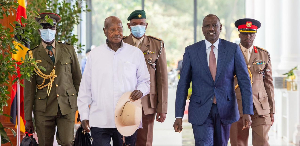 President Yoweri Museveni (L) and his William Ruto met at State House Nairobi on July 30, 2025
President Yoweri Museveni (L) and his William Ruto met at State House Nairobi on July 30, 2025
Trade restrictions among East African Community partner states are hurting economic progress in the region, Kenyan President William Ruto and Uganda’s Yoweri Museveni have warned.
At a joint press statement on Wednesday at the State House Nairobi, the two leaders expressed concern over reluctance by partners to open up markets.
The two leaders met in Nairobi to discuss various issues, including trade, security, and overall regional peace. The meeting came amid a rise of non-tariff barriers in a region where intra-trade is low.
The Ugandan leader said the region must “wake up” and make “rational” decisions about trade and economy.
The leaders discussed “persistent non-tariff barriers that hinder the flow of goods and frustrate the objectives of regional integration under the EAC framework.”
They did not name the culprits, but the meeting came as Tanzania roiled the regional Common Market by banning foreigners from engaging in “small businesses.”
In a Special Supplement on July 28, Dodoma argued it was shielding locals from unfair competition from foreigners. The private sector condemned the move.
Museveni said the wider eastern Africa region has operated like a house with rooms scattered in different countries.
“You have got countries like Uganda, which has no access to the ocean. South Sudan, Rwanda, Burundi, CAR, Chad…even Ethiopia — that big country — no access to the sea. And people are not working to solve that. They are content. And you are president, minister…what are you ministering about?” he said.
“If you are not solving the issue of access to the market, how will you solve that? Whoever is president, you will solve that. When you produce goods and services, the next question is who buys? If you don’t answer that and you are a leader…the future is very bleak. I am glad the region is waking up. How can you have a sitting room in another country, a bedroom in another country, a kitchen in another country…how can we have an arrangement like this?”
But Kenya and Uganda have also bickered over trade disputes especially on milk and poultry.
“The East African Community continues to demonstrate its ability as a good model for regional integration. We emphasise the centrality of unity, economic convergence, and shared prosperity as guiding principles for deeper integration,” Dr Ruto said.
According to the EAC Secretariat, intra-EAC trade has been rising steadily, albeit struggling with NTBs.
In 2024, the EAC’s total trade with the rest of the world grew by 14.17 percent to $124.9 billion, from $109.4 billion. Intra-trade increased by 9.35 percent, reaching $15.2 billion, or 12.17 percent of the total trade volume.
Yet experts at the East African Business Council say this could be as high as 60 percent were member states intent on implementing decisions they make around the common external tariff and non-tariff barriers.
The EAC Council of Ministers says that addressing common external tariff (CET) challenges and eliminating NTBs would unlock $63.4 billion in regional trade.
For example, four of the eight East African Community member states have focused on national interests in their budgets.
According to President Ruto is the chair of the EAC Heads of State Summit.
He said that a Joint Monitoring Committee (JMC) will hold its mid-term review in October, which will be crucial for the matters that affect trade across the borders. JMC is the formal joint technical committee meant to respond to issues affecting the two sides.
Ruto and Museveni signed an agreement on eight areas: trade, energy, mining, tourism, agriculture and animal industry, fisheries and aquaculture, investment promotion, and transport.
Both reiterated the need for regional peace and stability.
“We reaffirmed our position that security is essential to sustainable development and commended ongoing regional peace-building initiatives. We further agreed to collaborate closely in conflict resolution efforts, advocating inclusive approaches, supported by both regional and international frameworks,” their joint communique said.
